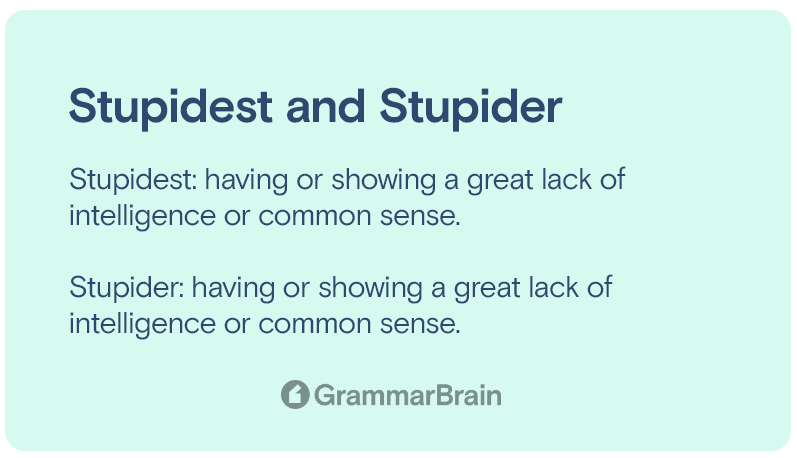Is stupidest a word? For non-native English speakers, the English language can tend to be not just challenging but also funny. Even native English speakers sometimes find comprehending the language, grammar, spelling, and meaning of words annoying.
There is a whole bunch of English words that seem to be so unreal that one may find them to be non-existent. However, many such words exist in full swing and are used in real-life situations and conversations.
Similarly, one may question the existence and validity of the word ‘stupidest’ and question if this word is even grammatically correct. The answer is yes, this word is a word in the English language.

What does “stupidest” mean?
Imagine you have a friend. Now imagine that you find your friend stupid and, at times, find him even more stupid. Added to this, you sometimes find him even more stupid than the most stupid version of him. This is where you fall short of words and shout at him, ‘you are the stupidest.’
But after shouting at him, you wonder if the word you just spilled at your friend is even accurate. Does this word even exist in dictionaries? Don’t worry, you are not wrong. The word you used is correct. So, stupidest is a word!
But what does it exactly mean? Stupidest is the superlative adjective of the word stupid which means not being sensible or intelligent in a certain situation or in general. It could be used to denote annoying, irritating, foolish, and senseless. It often sounds rude and insulting to the person to whom it is said.
| Word | Definition |
| Stupidest (superlative adjective) | having or showing a great lack of intelligence or common sense. |
| Stupider (comparative adjective) | having or showing a great lack of intelligence or common sense. |
What are superlative adjectives?
Superlative adjectives are adjectives that are used to show comparison while explaining something that is extreme. Comparative adjectives are used to compare and display minimal changes over time. There usually exists an upper and lower limit of comparison in using these adjectives.
In simple words, these adjectives denote something of the highest level. Therefore, stupidest means ‘the most stupid.’ The suffix ‘est’ is added to the word stupid making it stupidest.
Some examples of superlative adjectives are biggest, fastest, craziest, stupidest, etc.
Examples of “stupidest” in sentences
Sometimes concepts, words, and sentences become challenging to understand, and this is where examples help things become clear. Examples help us relate to the meaning of words or phrases, helping us to understand them in a straightforward and easy way.
Here are some examples that will help you understand the usage of the term stupidest more vividly.
Examples:
- She thinks that I’m the stupidest person in the room.
- He is not only stupid but the stupidest.
- You are just acting stupidest.
- Rajnikant is the stupidest person in this entire world.
- Shyama thinks she is the stupidest person after trusting Ravi again.
- I have never seen someone stupidest as you!
- Don’t try to be the stupidest.
- Jai sometimes acts stupidest, despite being so clever.
These examples must have clarified some doubts regarding the term stupidest. Now you can use this word more often without any fear.
Conclusion
Sometimes, words in English tend to sound so simple that we start to question their existence. The word stupidest is no different and is a common English word. So even if you find using the word ‘stupidest’ slightly awkward, it is used extensively in everyday conversations.
Next time you get annoyed with your friend, feel free to use the word stupidest.
Inside this article
Fact checked:
Content is rigorously reviewed by a team of qualified and experienced fact checkers. Fact checkers review articles for factual accuracy, relevance, and timeliness. Learn more.
Core lessons
Glossary
- Abstract Noun
- Accusative Case
- Anecdote
- Antonym
- Active Sentence
- Adverb
- Adjective
- Allegory
- Alliteration
- Adjective Clause
- Adjective Phrase
- Ampersand
- Anastrophe
- Adverbial Clause
- Appositive Phrase
- Clause
- Compound Adjective
- Complex Sentence
- Compound Words
- Compound Predicate
- Common Noun
- Comparative Adjective
- Comparative and Superlative
- Compound Noun
- Compound Subject
- Compound Sentence
- Copular Verb
- Collective Noun
- Colloquialism
- Conciseness
- Consonance
- Conditional
- Concrete Noun
- Conjunction
- Conjugation
- Conditional Sentence
- Comma Splice
- Correlative Conjunction
- Coordinating Conjunction
- Coordinate Adjective
- Cumulative Adjective
- Dative Case
- Determiner
- Declarative Sentence
- Declarative Statement
- Direct Object Pronoun
- Direct Object
- Diction
- Diphthong
- Dangling Modifier
- Demonstrative Pronoun
- Demonstrative Adjective
- Direct Characterization
- Definite Article
- Doublespeak
- False Dilemma Fallacy
- Future Perfect Progressive
- Future Simple
- Future Perfect Continuous
- Future Perfect
- First Conditional
- Irregular Adjective
- Irregular Verb
- Imperative Sentence
- Indefinite Article
- Intransitive Verb
- Introductory Phrase
- Indefinite Pronoun
- Indirect Characterization
- Interrogative Sentence
- Intensive Pronoun
- Inanimate Object
- Indefinite Tense
- Infinitive Phrase
- Interjection
- Intensifier
- Infinitive
- Indicative Mood
- Participle
- Parallelism
- Prepositional Phrase
- Past Simple Tense
- Past Continuous Tense
- Past Perfect Tense
- Past Progressive Tense
- Present Simple Tense
- Present Perfect Tense
- Personal Pronoun
- Personification
- Persuasive Writing
- Parallel Structure
- Phrasal Verb
- Predicate Adjective
- Predicate Nominative
- Phonetic Language
- Plural Noun
- Punctuation
- Punctuation Marks
- Preposition
- Preposition of Place
- Parts of Speech
- Possessive Adjective
- Possessive Determiner
- Possessive Case
- Possessive Noun
- Proper Adjective
- Proper Noun
- Present Participle
- Prefix
- Predicate



